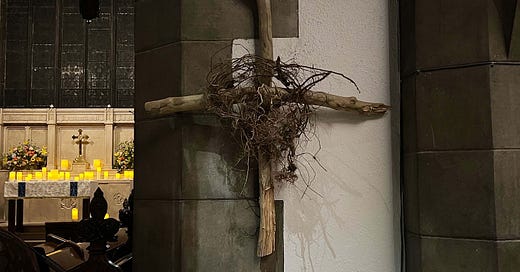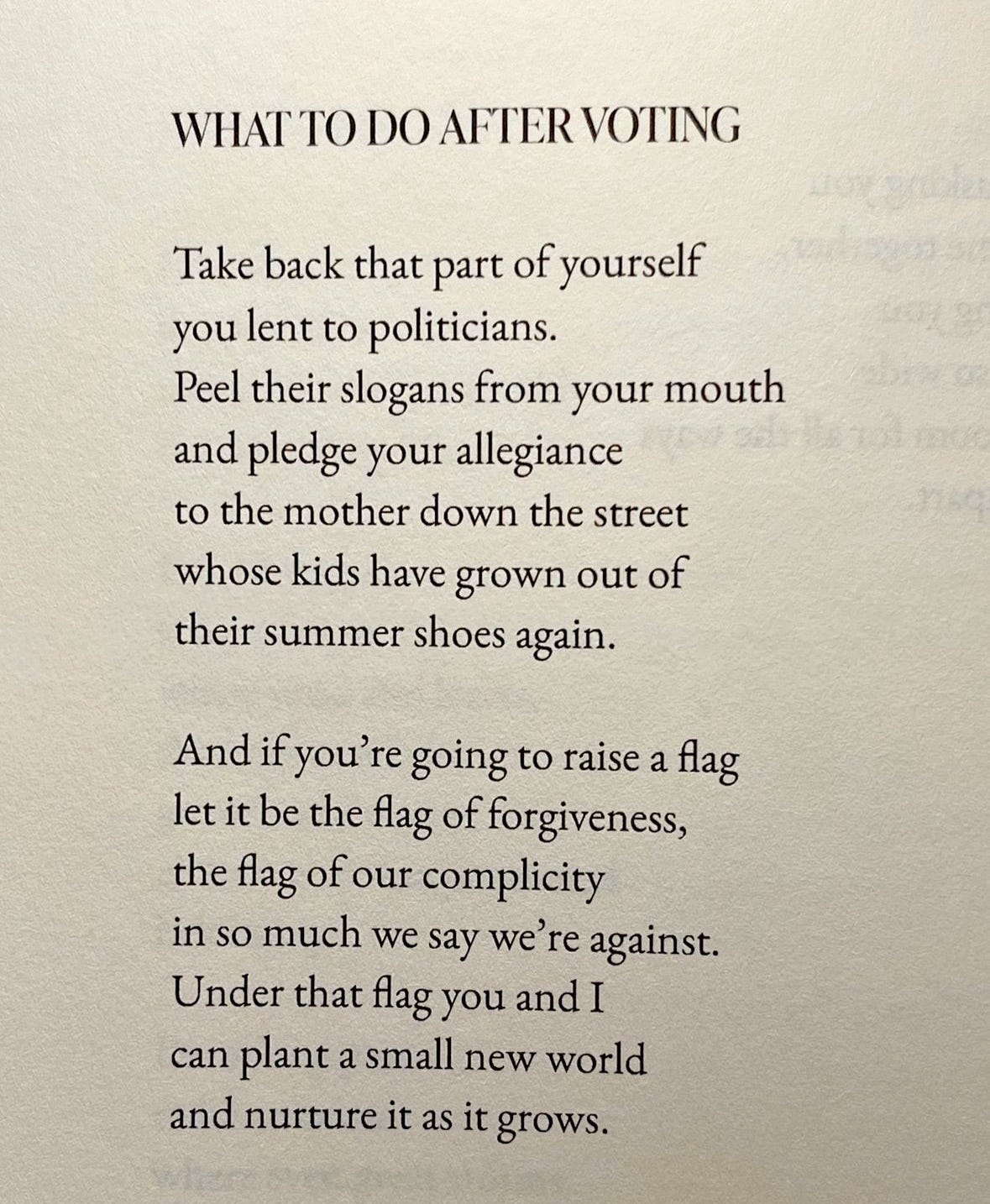Mark 12:38-44
As Jesus taught, he said, “Beware of the scribes, who like to walk around in long robes, and to be greeted with respect in the marketplaces, and to have the best seats in the synagogues and places of honor at banquets! They devour widows’ houses and for the sake of appearance say long prayers. They will receive the greater condemnation.”
He sat down opposite the treasury, and watched the crowd putting money into the treasury. Many rich people put in large sums. A poor widow came and put in two small copper coins, which are worth a penny. Then he called his disciples and said to them, “Truly I tell you, this poor widow has put in more than all those who are contributing to the treasury. For all of them have contributed out of their abundance; but she out of her poverty has put in everything she had, all she had to live on.”
(Adapted from my homily 11/10/24)1
The standard interpretation of this passage, especially when preached during stewardship season, is that we ought to be like this widow, and trust God with everything, and give sacrificially.
And certainly, that is true. Jesus does praise the widow and her action.
But that’s not the whole story in this passage. It’s not, actually, the main point at all.
For Jesus, the widow and her two small copper coins aren’t just laudable; they’re the last straw.
Just a day or two before, Jesus and the disciples had entered Jerusalem. When they came to the temple — you know this story — Jesus began driving out the merchants who were buying and selling there. He turned over their tables. He would not allow anyone to carry merchandise through the temple courts. And he said, quoting the prophet Jeremiah, “Is it not written: ‘My house will be called a house of prayer for all nations’? But you have made it ‘a den of robbers.’”
Over the next day or two, the religious leaders challenge his authority, try to trap him politically, misunderstand the scriptures, and – in today’s text – say long prayers for the sake of appearance. The religious leaders, Jesus says, devour widow’s houses: when a woman’s husband died, a temple scribe would often come in and manage her property for her. He would manage it right into his own bank account.
And now, Jesus sits in the outer courts of the temple – called the temple of women because this spot, where offerings could be made, was as far into the temple as women could go – he sits there under exceedingly beautiful and lofty columns. He looks at the treasury. This temple is not lacking in funds. He watches as “many rich people” offer large sums of money.
And he watches a widow put her last penny in the temple offering.
And after the cleansing of the merchants, and the arguments, and the attempted traps, it’s this that is the final straw.
One of the most repeated commands in the Hebrew Bible is the command to care for widows and orphans. In fact, in the same chapter of Jeremiah that Jesus quoted when turning over the tables of the money changers, the prophet says “If you do not oppress the foreigner, the orphan, and the widow … then I will dwell with you in this place.”2
In the community of God, no widows should ever be penniless. If they are, the project has failed.
Perhaps what Jesus sees, as that faithful widow gives all she has to God, is that this project has failed so badly that it has lost its reason to exist. Like the earth at the time of Noah — the damage is too deep to repair. It needs to be swept away in order to be saved.
The disciples, of course, don’t see any of this; as they leave the temple, they are focused on how impressive the building is.
“Look, Teacher! What massive stones! What magnificent buildings!” they say. How bigly our temple is, bigger than all the others, the biggest temple there’s ever been, no one has a bigger temple.
“Do you see all these great buildings?” Jesus says. “Not one stone here will be left on another; every one will be thrown down.”
*
The widow’s small act of faithfulness to God
while trapped in an unjust system of oppression and domination
was also a kind of nonviolent protest. And it worked.
She stood before those who had cheated her, and forced them to look her in the eyes as she put her last two coins in the offering plate
declaring her freedom from the game. If she has nothing left, there’s nothing left for them to take from her. You want to steal from me? she says. Here: have all of it. Have the very last penny. God will provide.
She was giving all she had to God, and giving up on them.
It was an act that brought shame upon the religious leaders, whether they knew it or not
and it was an act that caught the attention of God, (who was already on the way with deliverance in the person of Jesus, who was there witnessing it all).
*
It is possible for us in this moment
if we find ourselves under the rule of unjust leaders
who care more about lining their own pockets than providing for widows and orphans
It is possible for us in this moment to trust that
our small – defiant – acts of faithfulness to God
even if they seem as meaningless as a penny offered up
even if we feel powerless and angry
our small acts of faithfulness
might shame our unjust leaders
might catch the attention of God, and cause God to come and shake apart the things we’ve built that take God’s name in vain, that call evil good and good evil,
might cause God to say “not one stone here will be left on another.”
Of course that will only feel like good news if we’ve been choosing to stand, empty-handed, shoulder to shoulder with the widow.
And even then – It’s the kind of good news that will begin with loss and grief and death of the old ways
but will end with resurrection.
///
And so this story is an invitation to believe in small, seemingly meaningless acts of faithfulness—
But it's something else, too. It’s also an invitation to consider if there are places in our lives where we are more aligned with the wealthy than with the widows — where we are more aligned with those who appear righteous, who even make large financial gifts to good causes, all the while benefiting from systems that oppress the poor.
*
Of course there are.
And our hope is not that we can extricate ourselves from these systems of oppression and become good.
Our only hope is that through the power of the Holy Spirit working in us we might begin to practice the emptied and surrendered way of Jesus, of the widow: entrusting all we have to God, refusing the play the games of accumulation — and finding as we do that we are not alone.
Three Things:
One of my friends, when she finished reading Where Goodness Still Grows, told me that it was a scream of suppressed female rage. On the page, it’s not: it’s a thoughtful and almost overly-reasonable exploration of the virtues that I was taught as an evangelical child and teenager, and how they might need to be reimagined. But of course it is: it’s a wounded cry of “how could you trade women’s bodies for power?” If you know people who are just now now awakening to this question, I hope you’ll share this book with them. Here’s a paragraph from the introduction:
In my formative childhood years my Christian faith and my understanding of virtue were tied to a set of political beliefs and a particular subculture in America. But now I had to wonder: Had anyone believed in the virtues they'd taught me? Or had those virtue claims always been weapons wielded to preserve power for the powerful and keep everyone else in place? This man bragged about infidelity and abuse, said he had nothing to repent of, and walked into women's dressing rooms at beauty pageants to ogle them, as if he owned them. The Christian culture that taught me about fidelity, modesty, and sexual purity stayed silent. It appeared that my woman's body was a pawn they were willing to play in the game for political power.In Helene updates: we are still without potable water (probably until mid-December). The latest reports say that the storm caused moderate to catastrophic damage to more than 187,000 acres (about 20%) of both the Nantahala and Pisgah National Forests. Many roads are still closed, and trees and debris are everywhere. I think we’re going to put rugs in the basement instead of re-carpeting. Any tips on reasonable (not polyester-based) rugs?
Here are the prayers I wrote for our Evensong service of lament and hope after the storm. Pictured below: a cross made of debris from the River Arts District.I like this poem by James A Pearson.
Yours in deep grief, fear that I’m not strong enough for the fight, burning anger, and stubborn hope,
With gratitude for this commentary.
Jeremiah was told to stand by the doors of the temple, and say: “Reform your ways and your actions, and I will let you live in this place. 4 Do not trust in deceptive words and say, “This is the temple of the Lord, the temple of the Lord, the temple of the Lord!” 5 If you really change your ways and your actions and deal with each other justly, 6 if you do not oppress the foreigner, the fatherless or the widow and do not shed innocent blood in this place, and if you do not follow other gods to your own harm, 7 then I will let you live in this place, in the land I gave your ancestors for ever and ever. 8 But look, you are trusting in deceptive words that are worthless.”







So full of what we need, Amy, including your grief, anger, stubbornness, and all the rest. Thank you for your courage that never fails to inspire, enliven, and point the way.
Wow. This is so good. Thank you for it.